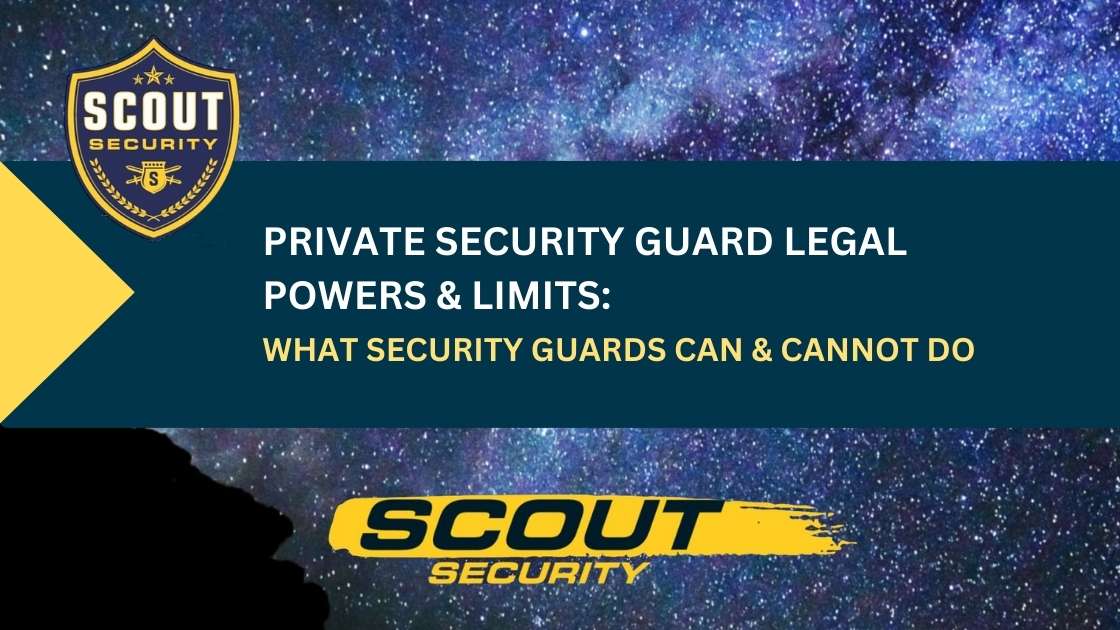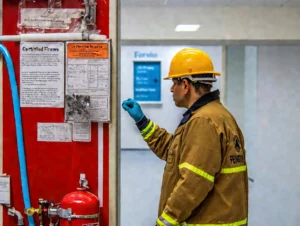Private security guards are not police officers and thus, do not have the legal powers that police officers have.
Security guards can greatly help in strengthening your overall security by acting as visible deterrents and first responders during security breaches. However, their legal powers have limitations and they basically have the same rights as a private citizen when it comes to acting on crimes.
To avoid liabilities on your part, ensuring that you hire certified private security guards who know their legal limits is important. That said, below are the things that security guards can and can’t do.
Scout Security’s private security guards are fully licensed and rigorously trained on various aspects of their role to ensure that they operate within the boundaries of the law. Thus, offering you peace of mind knowing that high-caliber guards are protecting your property in the Colorado Springs and Denver Metro areas from criminal activities. Call us now!
Key Takeaways
- The primary role of security guards is to observe suspicious activities, protect your people and property, and report incidents to law enforcement. Not to enforce the law.
- Guards can only use reasonable and justifiable force that is proportional to the security risk and safety of the people around. Force should be a last resort.
- Security guards can ask people to leave your premises, search people with their consent, make a citizen’s arrest, and detain suspected individuals for a reasonable amount of time.
- Guards cannot legally arrest people and detain law violators indefinitely. They should contact law enforcers immediately to take over and handle the situation legally.
What Can a Security Guard Legally Do?
Whether armed or unarmed, the primary mission of private security guards can be summarized in three words: observe, protect, and report to ensure the safety of your people, property, and assets.
Although security guards do not possess the same authority as police officers, they play a significant role under the law. Among their key responsibilities include preventing crime, monitoring for suspicious behavior, and responding decisively to security incidents within their jurisdiction while adhering to local laws and regulations.
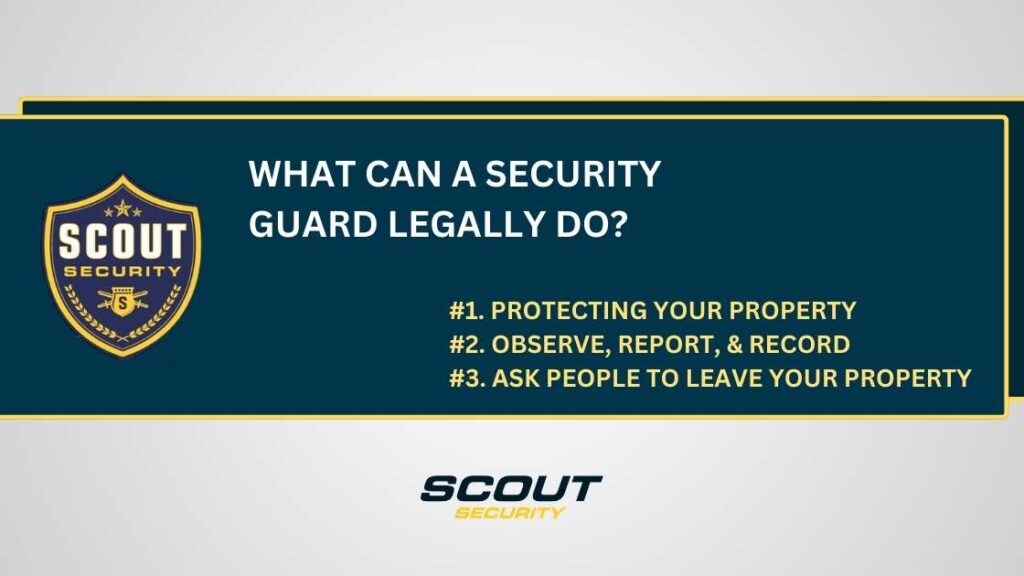
#1. Protecting Your Property
As we’ve mentioned, security guards play a crucial in safeguarding your premises and are tasked with a variety of duties to help them maintain safety and order. Their role allows them to ask individuals to leave your premises or stop loitering as well as detain individuals suspected of criminal activity under certain circumstances within the bounds of legality. (More on these later.)
NOTE: The jurisdiction of security guards is limited to the private property they have been hired to protect.
They perform proactive measures against theft, vandalism, and unauthorized entry which include conducting regular patrols, setting up barriers, and monitoring surveillance systems. Security guards should have a deep understanding of your local laws and regulations to be able to implement effective security protocols to keep your premises safe from potential threats.
Also Read: How Can Uniformed Security Guards Deter Crime in Your Business?
#2. Observe, Report, & Record
Security guards maintain safety and security on your property by vigilantly observing and monitoring your premises. They do this by keeping a watchful eye for any unusual activities or suspicious behavior through consistent rounds around your property or using live CCTV feeds to oversee the area.
Swiftly identifying and reporting any abnormalities to you (and law enforcement agencies if necessary) are essential components of their job. They also document all incidents and activities during their rounds to create detailed and accurate logs that can be useful for future reference, investigation, or legal purposes. This prevents liabilities on your part in case of potential lawsuits.
Body cams are also commonly used by security guards to provide visual evidence to support their actions and ensure adherence to legal standards.
Also Read: Why Private Security and Law Enforcement Collaboration is Crucial
#3. Ask People to Leave Your Property
Security guards can ask people to leave your property to maintain the safety and security of your premises. However, any action taken should respect legal boundaries and prioritize resolving the situation with minimal conflict.
Guards can request an individual to vacate your property assuming that the individual is on private property without a legitimate purpose or has trespassed.
This is particularly common in construction sites and private events where security guards can inquire about an individual’s presence on your property. They can even involve law enforcement or other authorities should the need arise, especially if the individual refuses to comply with the request to leave.
Moreover, a security guard’s approach must always be appropriate to the situation at hand. Using force is strictly regulated by civil laws where physical interventions must be reasonable and proportionate to the circumstances.
For instance, in situations where a person is not engaged in illegal activities, a security guard should employ a non-confrontational approach that aims to resolve the situation peacefully.
Even when a security guard may need to perform a citizen’s arrest, only reasonable force can be justified.
Also Read: How Security Guards Handle Conflicts & De-escalate Violent Situations
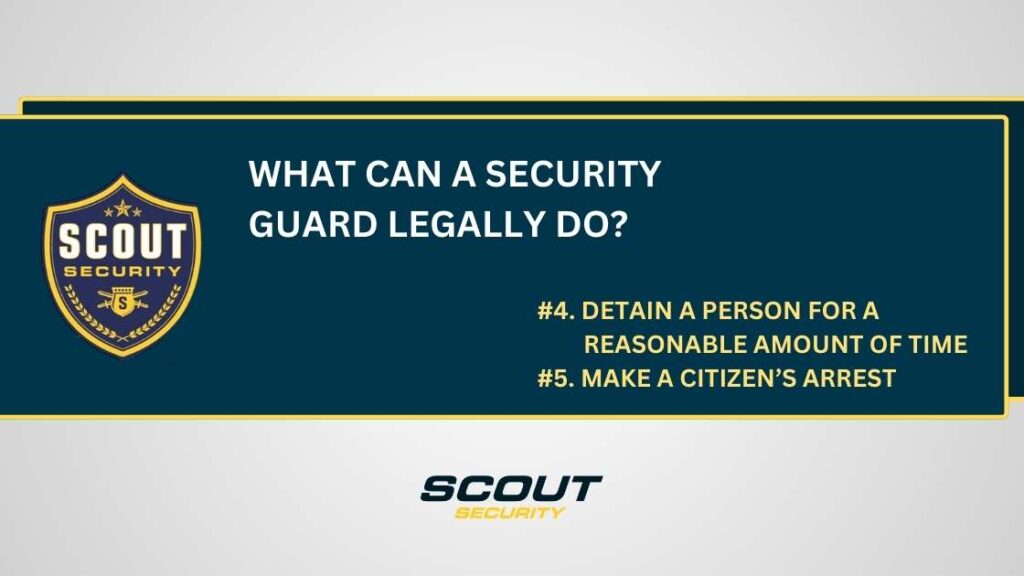
#4. Detain a Person for a Reasonable Amount of Time
Security guards, who are working as your agents, can detain individuals under certain circumstances if it is included in the scope of their duties and allowed in your state. Usually, their authority to detain is the same as that of civilians which means they can temporarily hold a person until law enforcement arrives.
But again, detainment should be done reasonably. In addition to this, they may:
- Use handcuffs if necessary
- Conduct a pat-down to check for weapons
- Prevent the suspected individual from leaving until law enforcement arrives
NOTE: If law enforcement arrives and has determined that the individual has not committed any crime, the detention can result in liabilities.
Thus, security guards must undergo comprehensive training to understand the legal boundaries of detainment. This prevents them from overstepping their bounds and potentially facing civil or criminal liabilities.
Security agencies and even clients often have specific policies regarding detainment and may restrict or prohibit detentions. Thus, resulting in public misconceptions that security guards are not capable of intervening in the event of criminal incidents.
Also Read: Security Guards vs. Police Officers: Key Differences & Similarities
Reasons for a Security Guard to Detain an Individual
NOTE: Detainment policies will vary per jurisdiction.
- If the security guard believes that the individual has committed a crime on the property he/she is safeguarding
- If someone has directly observed the individual committing a crime
- If the individual poses a threat to others or themselves
- If the person is breaching the peace on your premises
- To prevent or stop the individual from destroying your property
- To prevent suspected individuals from escaping until police officers arrive
In some jurisdictions, security guards also have the authority to detain individuals in public areas if they believe a crime has been committed.
How Long Can a Security Guard Detain an Individual?
Detention is not an actual arrest. Security guards can only detain an individual briefly until law enforcement arrives.
#5. Make A Citizen’s Arrest
Security guards can make a citizen’s arrest like any other private citizen provided that the security personnel has directly witnessed the individual committing a felony.
Take note that a citizen’s arrest is not the same as the actual arrest done by police officers. It is more like physically restraining a suspect (i.e. detaining) indefinitely until law enforcement arrives to perform an actual arrest.
If a security guard tries to hold an individual against their will and fails to make a legal citizen’s arrest, the guard can be sued for false imprisonment.
Also Read: Proprietary Security vs Contract Security Companies: Which Suits Your Business Best?
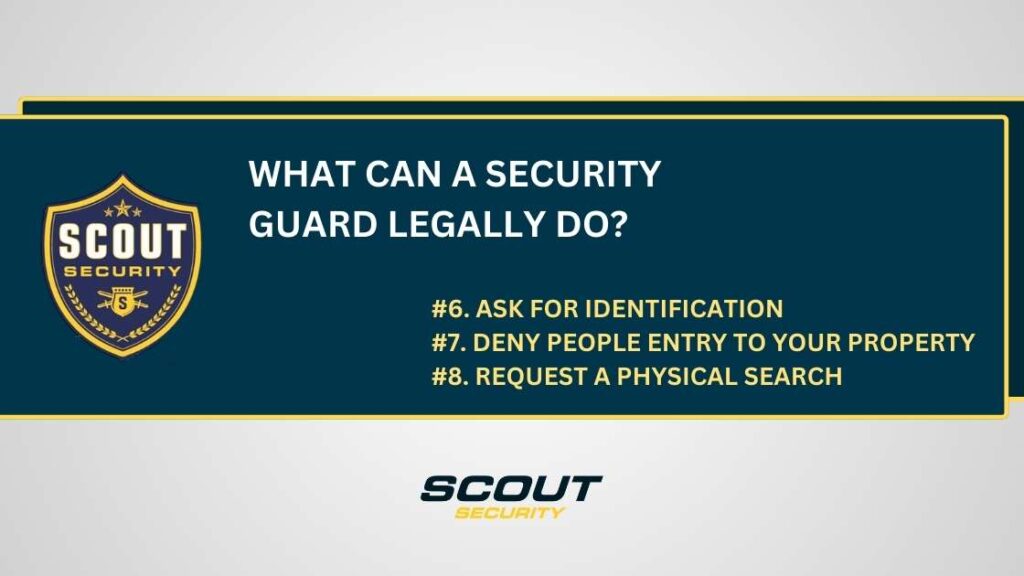
#6. Ask For Identification
Generally, security guards have the right to ask for identification from individuals seeking entry into private settings (e.g. bars) to ensure that they are authorized to enter restricted areas. However, this should be done fairly without discrimination.
Security guards often do not have the authority to request identification in public spaces, especially if the individual is not committing any unlawful act.
#7. Deny People Entry to Your Property
Private security guards also have the responsibility to control access to your property which involves denying entry to unauthorized people or those without an invitation if it is an event. Thus, protecting your property (or events you are hosting) from potential threats and distractions as well as minimizing the risk of security incidents.
#8. Request a Physical Search
Requesting for and executing physical searches is part of a security guard’s duties to ensure safety and prevent theft from occurring on private property.
Guards can search individuals entering and exiting a private property for general security checks or if they have a reasonable suspicion of theft. For instance, it’s common for security personnel to inspect the bags of customers exiting a store if they suspect shoplifting or check your employees’ bags post-shift.
When is a Physical Search Permitted?
Private security can only search people, their belongings, and vehicles if the person’s consent is given.
If the individual does not give his/her consent, guards cannot legally perform a search. However, those who refuse a bag search may be denied entry. Suspected individuals who have refused a search may also be detained until law enforcement arrives to conduct a legal search (e.g. the individual is suspected to be hiding a bomb).
Exceptions for Searches Not Requiring Consent
- When assets are left unattended to identify the owner or to check for signs of unlawful activities
- When there is a legitimate concern over weapons where the guard may disarm individuals or perform a citizen’s arrest
- During health emergencies where the guard may inspect the concerned person’s belongings to locate prescriptions
- In employment settings where a search is part of an employee’s contract
Also Read: 10 Benefits of Hiring a Security Guard to Protect Your Business
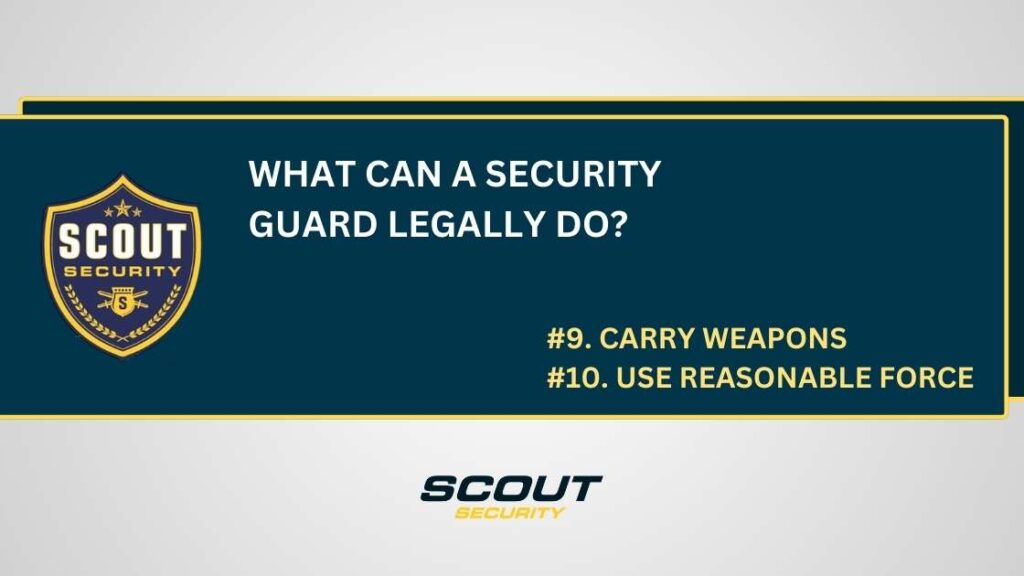
#9. Carry Weapons
Can Security Guards Carry Weapons or Firearms?
Yes, but not all security guards can carry firearms. Only armed guards who are certified and trained to use firearms can carry them.
However, these armed guards must comply with state gun laws and undergo more rigorous training than that taken by unarmed guards. Nonetheless, unarmed guards can still carry nonlethal weapons (e.g. batons, pepper sprays, and tasers) intended for self-defense and safe handling of security incidents.
The use of weapons should depend on the severity of the threat and the safety of the people in the vicinity.
One Thing to Know About Hiring Armed Guards
Armed guards are not always a necessity for businesses, except for high-risk environments that may require the use of force in case of security incidents. Unarmed guards who are often focused on conflict management are more common in many businesses to ensure the comfort of your customers and employees.
Also Read: Armed vs Unarmed Security Guards: How to Determine Your Security Needs
#10. Use Reasonable Force
This summarizes the condition in which security guards can practice their legal powers – they must use reasonable and justifiable force.
Security guards can use force when necessary (i.e. making a citizen’s arrest or ejecting trespassers) but should exhaust other strategies like effective de-escalation before considering physical intervention. If force must be used, it must be proportional to the threat posed and aim to minimize harm.
Using excessive force could lead to significant legal liabilities and destroy your company’s image.
Force should be the last resort.
What Security Guards Cannot Do
The legal powers of security guards are limited compared to police officers.
As a business owner or property manager, you should make sure that you hire guards who are aware of their limitations to avoid legal liabilities.
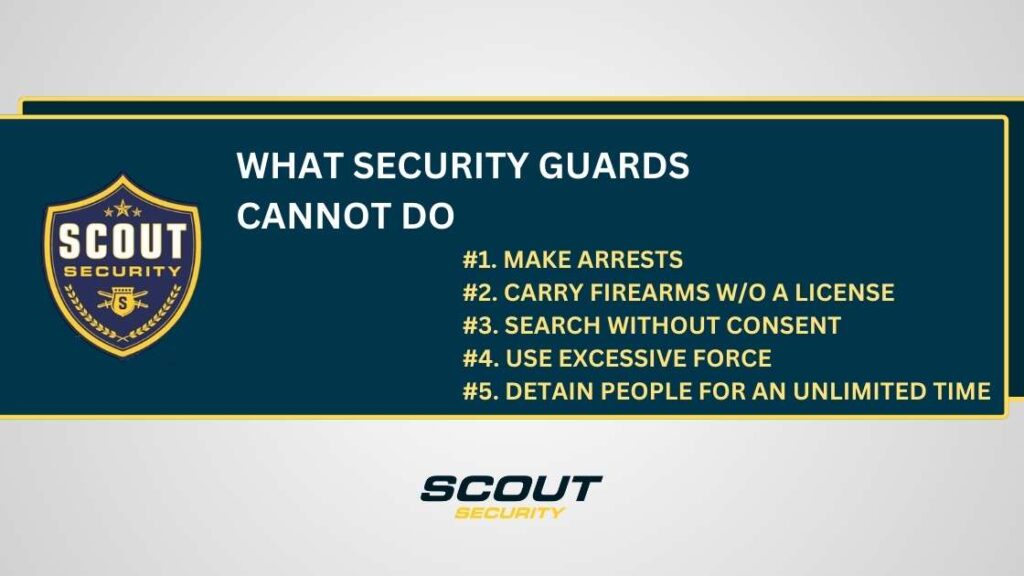
#1. Make Arrests
Security guards cannot legally conduct arrests (this is different from a citizen’s arrest). Unless given the power to do so, security guards are only limited to observing, documenting, and reporting questionable incidents within their patrol area. They should report their findings to relevant authorities to ensure that potential criminal actions are addressed legally.
Also Read: How to Increase Business Security With a 24-Hour Guard
#2. Carry Firearms Without a License
Don’t get confused, but security guards can and cannot carry firearms depending on the firearms licensing requirements in your state. Make sure to consider these laws before you decide on hiring armed security guards.
#3. Search Without Consent
As we’ve said, security guards cannot search people without their permission because this violates the person’s constitutional rights. This authority is limited to the police.
#4. Use Excessive Force
Security guards, under any circumstances, are strictly prohibited from using excessive force. Again, the use of force should align with the severity of the incident the guard is dealing with. Otherwise, not only will it pose physical risks but also lead to legal consequences. The security guards might even be arrested and prosecuted.
Excessive force may include:
- Using handcuffs improperly
- Discrimination
- Using abusive and threatening language
- Choking
- Inflicting pain
#5. Detain People for an Unlimited Time
Security guards cannot detain individuals indefinitely. They are required to contact law enforcement if a situation requires further investigation or arrest. They can only restrain law violators for the amount of time necessary for police to arrive.
Also Read: How to Hire a Security Guard: 7 Factors to Consider & More
Other Key Things to Note About a Security Guard’s Legal Powers
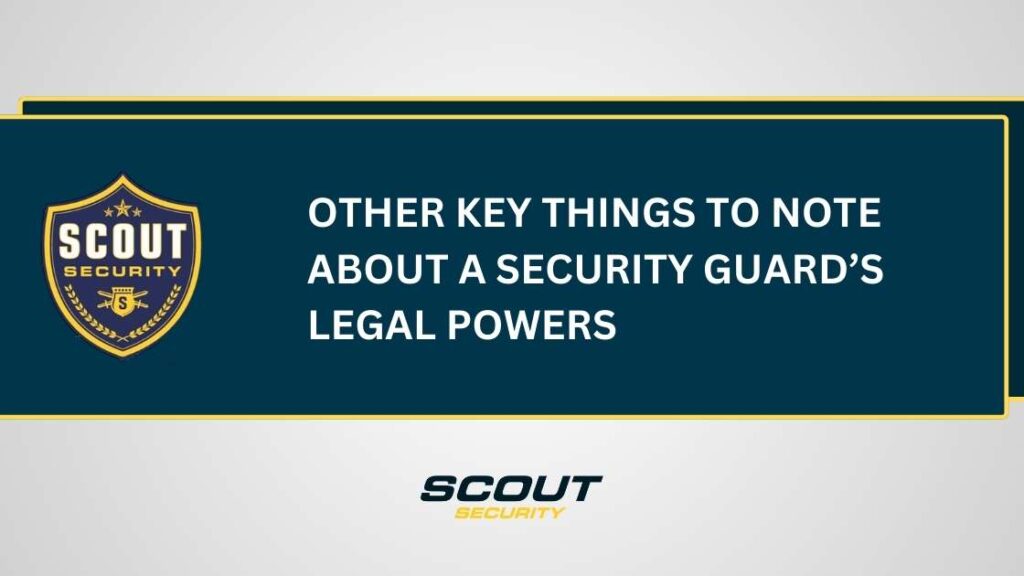
- The authority of security guards varies by state law and depends on their credentials and the deputizing agency.
- Security guards can have more legal powers if they are also police officers or are members of law enforcement.
- Security guards may receive special authorized powers from local governing bodies which enhances their capabilities beyond those of an ordinary citizen.
- The designation of a security guard determines their legal capacities and limitations.
Also Read:
- 15 Different Types of Security Guards & What They Do: A Guide for Property Managers
- 15 Top Qualities of a Good Security Guard: Skills to Look For
- When Should You Hire Short-Term or Temporary Security Guards?
- 11 Problems a Security Guard Can Help You Solve
FAQs
Security guards cannot make arrests (only limited to citizen’s arrests), carry firearms if not certified to do so, search without consent, use excessive force, and detain people indefinitely.
The limitations of the legal authority of security guards vary across states and companies as well as their designation. Most guards have the legal powers of an ordinary citizen, but some are granted special powers by local government institutions and can also have police powers.
Yes, security guards can defend themselves if threatened or need to protect the people within their jurisdiction. However, they should only use reasonable force that is proportional to the threat they are facing. In cases where the threat has escalated significantly, guards should call law enforcers.
Conclusion
To ensure that you are hiring competent security guards who will not overstep their legal bounds, ensure that they have the required licenses and certifications. This guarantees that they are well-equipped not only with the skills but also the legal knowledge needed to handle security incidents effectively without violating applicable laws.
Scout Security only employs highly trained guards consisting of former law enforcers and military personnel who have passed a rigorous screening process. Thus, ensuring that you receive security solutions of the highest standard in the Denver Metro and Colorado Springs areas. Reach out to us to learn more about our services!

